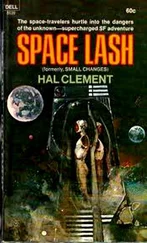But the thing that bothered Grant the most was the fact that not a single button, light, or group was accom-panied by a written label of any sort. He would not have expected to be able to read any such writing; but there had been the vague hope that control labels might have been matched with similar labels on the machines or charts — if the other men found any of either. It was peculiar, for there were in all several hundred buttons; and many of the groups could easily have been mistaken for each other. He put this thought into words, and McEachern frowned behind his helmet mask before reply-ing.
“According to Cray’s logic, why should they be la-beled?” he remarked finally. “Do we allow anyone to pilota ship if he doesn’t know the board blindfolded? We do label ours, of course, on the theory that an inexperienced man might have to handle them in an emergency; but that’s self-deception. I’ve never heard of any but a first-rank pilot bringing a ship through an emergency.
Labeling controls is a carry-over from the family auto and airplane.”
“There’s something in that,” admitted the captain. “There’s also the possibility that this board is labeled, in a fashion we can’t make out. Suppose the letters or characters were etched very faintly into.hat metal, which isn’t polished, you’ll notice, and were meant to be read by, say, a delicate sense of touch. I don’t believe that myself, but it’s a possibility — one we can’t check, since we can’t remove our suits to feel. The fact that there are no obvious lights for this board lends it some support; they couldn’t have depended on sunlight all the time.”
“In either case, fooling around here at this stage may do more harm than good,” pointed out McEachern. “We’ll have to wait until someone gets a machine identified, and see if tampering with it produces any results here.”
Grant’s helmet nodded agreement. “? never had much hope of actually starting the ship,” he said, “since it seems unlikely that anything but mechanical damage of a serious nature could have stranded it here; but I did have some hopes for the communicators. There must be some.”
“Maybe they didn’t talk,” remarked the navigator.
“If that’s your idea of humor, maybe you’d better not, yourself,” growled Grant. He vaulted back to the catwalk, and morosely led the way forward, to see if the engineers or freelance investigators had had any luck. McEachern followed, regretting the remark, which must have jarred the commander’s optimism at an unfortunate time. He tried to think of something helpful to say, but couldn’t, so he wisely kept quiet.
Halfway to the bow; they met Preble and Stevenson, who had satisfied themselves that the others could do better in the engine room and were continuing their own general examination of the ship. They gave the officers a brief report on events forward, showed them the metal rings found by the air lock, and went on aft to find some means of visiting the corridors which presumably existed above and below the main one. The control room seemed the logical place to look first, though neither had noticed any other openings from it when they were there the first time.
Perhaps the doors were closed, and less obvious.
But there were no other doors, apparently. Only two means of access and egress to and from the control room appeared to exist, and these were the points where the main corridor entered it.
“There’s a lot of room unaccounted for, just the same,” remarked Stevenson after the search, “and there must be some way into it. None of the rooms we investigated looking for that `key’ had any sign of a ramp or stairway or trapdoor; but we didn’t cover them all. I suggest we each take one side of the bow corridor, and look behind every door we can open. None of the others was locked, so there shouldn’t be much trouble.”
Preble agreed, and started along the left-hand wall of the passage, sweeping it with his light as he went. The chemist took the right side and did likewise. Each reached a door simultaneously, and pushed it open; and a simultaneous “Here it is” crackled from the suit radios. A spiral ramp, leading both up and down, was revealed on either side of the ship, behind the two doors.
“That’s more luck than we have a right to expect,” laughed Stevenson. “You take your side, I’ll take mine, and we’ll meet un above.”
Preble again agreed silently, and started up the ramp. It was not strictly accurate to call it a spiral; it was a curve evidently designed as a compromise to give some traction whether the ship were resting on its belly on a high-gravity planet, or accelerating on its longitudinal axis, and it did not make quite a complete turn in arriving at the next level above. Preble stepped onto it facing the port side, and stepped off facing sternward, with a door at his left side. This he confidently tried to push open, since like the others it lacked knob or handle; but unlike them, it refused to budge.
There was no mystery here. The most cursory of examinations disclosed the fact that the door had been welded to its frame all around — raggedly and crudely, as though the work had been done in frantic haste, but very effectively. Nothing short of a high explosive or a heavy-duty cutting arc could have opened that portal. Preble didn’t even try. He returned to the main level, meeting Stevenson at the foot of the ramp. One look at his face was enough for the chemist.
“Here, too?” he asked. “The door on my side will never open while this ship is whole. Someone wanted to keep something either outside or inside that section.”
“Probably in, since the welding was done from out-side,” replied Preble. “I’d like to know what it was. It would probably give us an idea of the reason for the desertion of this ship. Did you go down to the lower level?”
“Not yet. We might as well go together — if one side is sealed, the other probably will be, too.
Come on.”
They were still on the left-hand ramp, so it was on this side that they descended. A glance at the door here showed that, at least, it was not welded; the pressure of a hand showed it to be unlocked. The two men found themselves at the end of a corridor similar in all respects to the one above, except that it came to a dead end to the right of the door instead of continuing on into the central chamber. It was pitch-dark, except for the reflections of the hand lights on the.
polished metal walls and along either side were doors, perhaps a trifle larger than most of the others on the ship. Many of these were ajar, others closed tightly; and by common consent the men stepped to the nearest of the former.
The room behind it proved similar in size to those above, but it lacked the articles which the men had come to look upon as the furniture of the long-dead crew. It was simply a bare, empty cubicle.
The other chambers, quickly examined, showed no striking difference from the first. Several contained great stacks of metal ingots, whose inertia and color suggested platinum or iridium; all were thickly coated with dust, as was the floor of the corridor. Here, too, there must have been organic materials, whether crew or cargo none could tell, which had slowly rotted away while the amazingly tight hull held stubbornly to its air. The makers of the ship had certainly been superb machinists — no vessel made by man would have held atmosphere more than a few months, without constant renewal.
“Have you noticed that there is nothing suggestive of a lock on any of these doors?” asked Preble, as they reached the blank wall which shut them off from the engine room in front.
“That’s right,” agreed Stevenson. “The engine-room port was the only one which had any obvious means of fastening. You’d think there would be need to hold them against changes in acceleration, if nothing else.”
Читать дальше












